Guangzhou, capital of the southern Chinese province of Guangdong, will be the setting of the crowning of new World Champions in badminton in 2013 expects our preview specialist, Aaron Wong.
Photos: Badmintonphoto
What stands between a player becoming a legend or not — and the supreme adulation or satisfaction and, conversely, the massive regret or burden of what other’s think when it doesn’t happen — may be just a matter of minutes or seconds.
The point about points
For athletes, every point is important. But not all points are created equal. Lin Dan, considered the greatest player badminton has ever known, failed to grab the single point he wanted despite holding the advantage of 10 match points at the 2006 Malaysian Open final. Ask Lee Chong Wei, the most consistent world number 1 of any of the disciplines, about leading all the way to 19-19 in last year’s London Olympic final and the subsequent anguish of not securing the remaining two points. Camilla Martin (pictured) too would agree having earnt World Championship honour in front of her home crowd by refusing to go to deuce, thus opting for a sudden death denouement between her and Dai Yun, after her Chinese opponent had erased the Dane’s seven match points to level at 10-10 on the old scoring system. Tense moments all these, and much less for those watching.
What all winning badminton players want, professional or amateur, whether they realise it or not, is to play without having a distracting thought entering their mind such as “only 1 point away” or “I’ve beaten that person before”. Once stuck in one’s head, it is almost impossible to shake it off in time, and usually results in the loss of that game. The 21 points rally scoring system is especially ruthless like that. Camilla Martin was lucky to eliminate the thought in a nick of time in Bronby, Denmark, that day in 1999.
Mixed Doubles: Insider Knowledge
In mixed doubles, can the world number 1 duo Xu Chen / Ma Jin (pictured) defeat compatriots and last year’s Olympic champions Zhang Nan / Zhao Yunlei, should both pairs meet in the final?
Xu/Ma have been up to the task only once in 12 head to head full matches which is by far the most severe loss-win ratio of any of the favourites of any discipline against an opponent coming into this tournament. Part of the reason for this poor success rate one suspects is that both Zhang and Zhao have each partnered Xu for a period previously and therefore know and exploit his weaknesses. Xu is also a player who gets visibly worried during these matches. 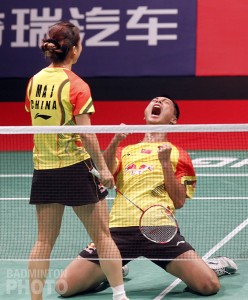
To make it to the final, Xu/Ma have to contend with the best of the Europeans on their side of the draw including the top pair of Fischer-Nielsen/Pedersen of Denmark, former world number 1s Polish Mateusiak/Zieba, and 2011 Worlds’ runner up Chris Adcock of England who currently partners Gabrielle White — all of whom the Chinese have a positive record against.
By contrast, second seeded Zhang/Zhao could stumble against the former Thai world number 1s Prapakamol/Thoungthongkam at the quarter-final stage. If not, a semi-final clash with 2012/2013 All England champions Tantowi Ahmad / Lilyana Natsir of Indonesia would be extremely appealing to watch. The Indonesians won the last two occasions in straight games and all the times this Chinese pair emerged on top they needed to dig out three games.
First round match of note:
Kona Tarun / Ashwini Ponnappa [IND] vs. Hirokatsu Hashimoto / Miyuki Maeda [JPN]
Men’s Doubles: End of the Cai/Fu era
Korea’s Lee Yong Dae was touted for greatness during his teens and lived up to expectations by winning gold in Olympic mixed doubles while still one, and later reaching the world number 1 ranking in two men’s doubles partnerships so far. Will he also become a World Champion?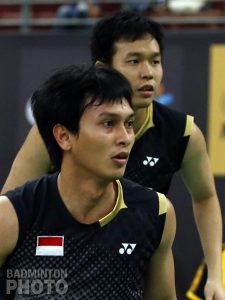
Lee has delivered the most nail biting World Championship men’s doubles finals despite coming runner-up, and seemed the man most likely for Olympic glory in this category last year but fell short to the Danes who peaked at that semi-final. In 2013, he is the favourite not simply by virtue of his top rank but in teaming up with Ko Sung Hyun who has gone equally far in World Championships, having been a runner-up himself in 2011 (then partnering Yoo Yeon Seong), so their ambitions are perfectly in tune. Obstructing a dream run at the quarter finals for Lee/Ko could be the pair they have lost to in straight games every time over three Super Series finals this year and yet to beat overall, Indonesia’s Hendra Setiawan / Mohammed Ahsan (pictured).
Thais, Taiwanese, Indonesians, and Koreans who were in top ten last year and found themselves in new partnership since London 2012 have all managed to be seeded again. So judging by the momentum of this year’s big improvers on the circuit, the Worlds title looks likely to be usurped by a new combination of established names rather than long established pairs. However, one altogether fresh combination capable of bucking this trend are China’s Liu Xiaolong / Qiu Zhihan who have proven themselves by becoming All England victors five months ago.
First round matches of note:
Hong Wei / Shen Ye [CHN] vs. Chen Hung Ling / Lu Chia Pin [TPE]
Women’s Doubles: Tang to Tango?
Of all the disciplines, women’s doubles has gone the longest without a change in the national anthem at the World Championships since Ageukga was played for Gil Young Ah and Jang Hye Ock back in the mid-nineties.
The most interesting match on paper are the new Chinese world number 2 combination of Ma Jin / Tang Jinhua meeting the reformed London Olympic gold medal duo of Zhao Yunlei / Tian Qing, also of China. A quarter-finals between them would be a delicious first encounter in international competition. The winner of that match are the ones most likely to face world number 1 and defending World Champions Wang Xiaoli / Yu Yang.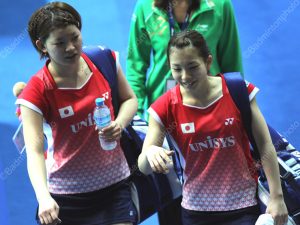
Although the Zhao/Tian have are the only pair heading in, as well as being one of three pairs ever, to have defeated the Wang/Yu, Ma/Tang and Japanese world number 3 Misaki Matsumoto / Ayaka Takahashi (pictured) have the next best credentials as the only other pairs in the rest of the competition who have snatched a game off the defending champions. Tang, however, has the slight edge having achieved this twice across different partnerships.
The Japanese pair have the good fortune of finding themselves in the bottom half of the draw which translates to a possibility of contending the final. Japanese women have reached the finals of the All England and the Olympics in recent years so this scenario, though slim, is not as unlikely as you might initially think.
First round match of note:
Imogen Bankier [SCO] / Petya Nedelcheva [BUL] vs Narissapat Lam / Saralee Thoungthongkam [THA]
Women’s Singles: Ripe to usurp
China’s national anthem has been played non-stop ever since Camilla Martin’s climbed down the podium, with 7 different Chinese world champions etched into history since the millennium began for women’s singles. But, if there was ever a time ripe for a change it is now.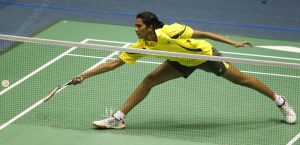
The current crop of Chinese players are no less formidable but it is the other nationalities that increased their skillfulness, especially the Thais. Almost a third of the seeded players are still teenagers, and there are threats also from non-seeds such as two teens from Spain, and the rising collective confidence of the Indonesians. Having reached a career high of world number 2 some months ago, German Juliane Schenk’s early withdrawal is keenly felt because it might have been her year but we will never know.
The tall and imposing defending champion Wang Yihan may not enjoy having size as a distinct advantage on the road to the final as she almost certainly has a third round rendezvous against India’s P.V. Sindhu (pictured) who has stretched her to three games in their only meeting. Further down the track could be Korea’s Sung Ji Hyun who loves spending no less than an hour with Wang on court as evidenced by their last five meetings. India’s Saina Nehwal, seeded third, would be pleased to be in the other half of the draw as, out of all the seeded Chinese, she has yet to properly beat Wang.
First round matches of note:
Sayaka Takahashi [JPN] vs. Tee Jing Yi [MAL]
Adrianti Firdasari [INA] vs. Carolina Marin [ESP]
Men’s Singles: Boon for Boonsak
This World Championships is notable for the most recognised men since the late nineties, Peter Gade and Taufik Hidayat, having departed the scene permanently. Through them, the men’s singles category has redefined our ideas of how long a professional badminton athlete can last at the top of the game. Thailand’s Boonsak Ponsana (pictured) , aged 31, and Indonesia’s Sony Dwi Kuncoro, aged 29, are enjoying a resurgence in their careers and ranking about as high as during their peaks in the early 2000s. The Thai is the recipient of a particularly good draw as the other seeded players in his quarter will have been tired out by their opponents while the Indonesian stands out as a name credibly capable of derailing China’s main hopes of Chen Long and Lin Dan.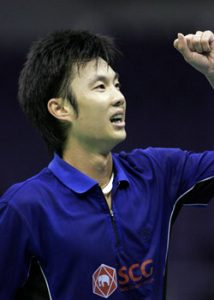
The best up and comers, like China’s Wang Zhengming and Indonesia’s Tommy Sugiarto, are in the top half of the draw along with top seed Lee Chong Wei of Malaysia. How well anyone will do against the Malaysian largely depends on the quality of their shuttle retrieving skills in addition to a full repertoire for that is the way to begin to plant seeds of doubt in the mind of the player carrying the highest personal and spectator expectations on his shoulders.
Will Lee Chong Wei become World Champion? Paradoxically, that question and whether will be another Lin Dan and Lee Chong Wei encounter here are the least interesting despite it being the most highly anticipated match. Chong Wei has been poised for years for the grand moments of glory. It is not like we haven’t seen him win over Lin Dan before. A lot of people just want to see him accomplish it at a huge occasion and this is a title he has yet to claim.
First round matches of note:
Tommy Sugiarto [8][INA] vs. Hans-Kristian Vittinghus [DEN]
Hu Yun [8][HKG] vs. Niluka Karunaratne [SRI]
Ajay Jayaram [IND] vs. Wong Wing Ki [12][HKG]
Lee Dong Kuen [KOR] vs. Jan O Jorgensen [9][DEN]
What is mental toughness actually?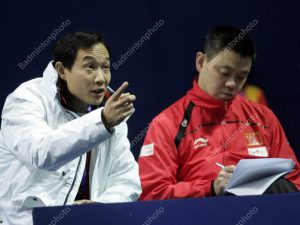
Mental toughness or lack thereof is the mass’s easy answer to all outcomes given hindsight. Whatever mental toughness actually is, it must surely also include wisdom. And being wise means knowing beforehand that sport is sport, and at crucial moments all decisions ought to be handed over to the body’s muscle memory because reaction speed is the priority. It is possible that too much self pep talk can be detrimental. Notice some coaches go up to their players without advice to advance. What a player needs sometimes is to be left to live in the moment and fend with his or her own instincts. Whereas, players with an entourage of advisers listen at their own peril when worried.
Shrug off a worry or any analytical thought during a match or else it might matter little that you are the technically superior player. And spectators will witness such near misses or victories by a sliver depending on how well an athlete managed to do that in Guangzhou this week.
Click to view the complete draw.
![WORLDS 2013 Preview – Not all points are created equal Guangzhou, capital of the southern Chinese province of Guangdong, will be the setting of the crowning of new World Champions in badminton in 2013 expects our preview specialist, Aaron Wong. […]](http://www.badzine.net/wp-content/uploads/xu.jpg)
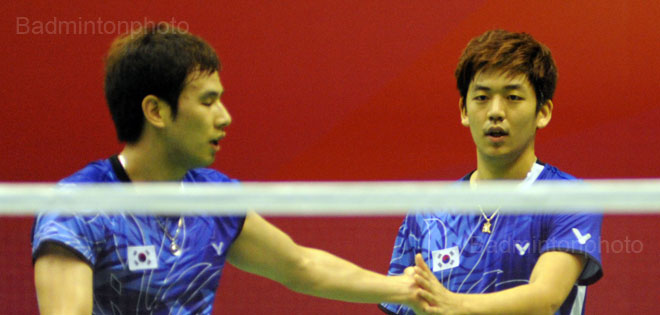
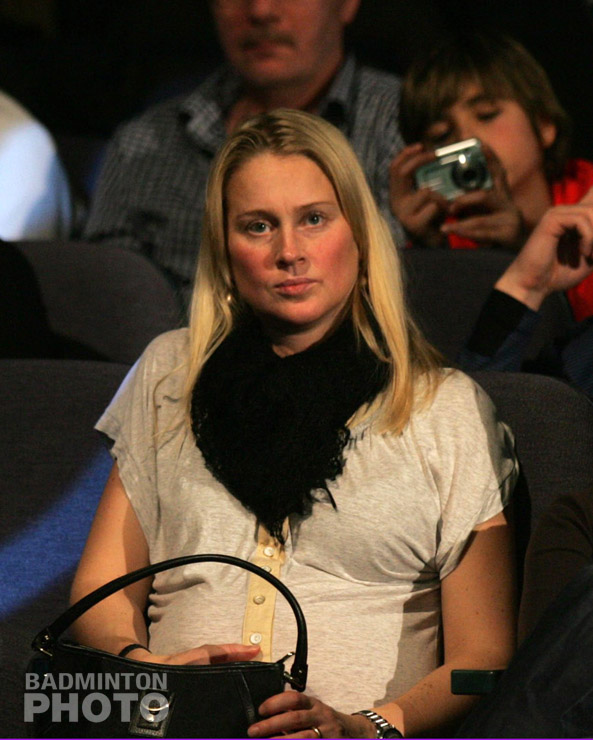

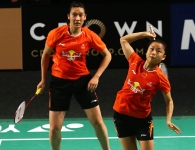
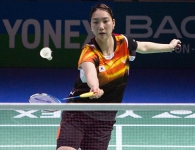
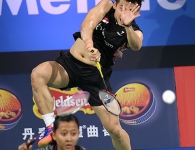
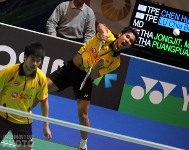
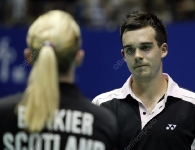
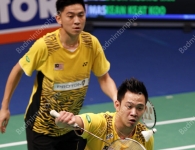
Leave a Reply